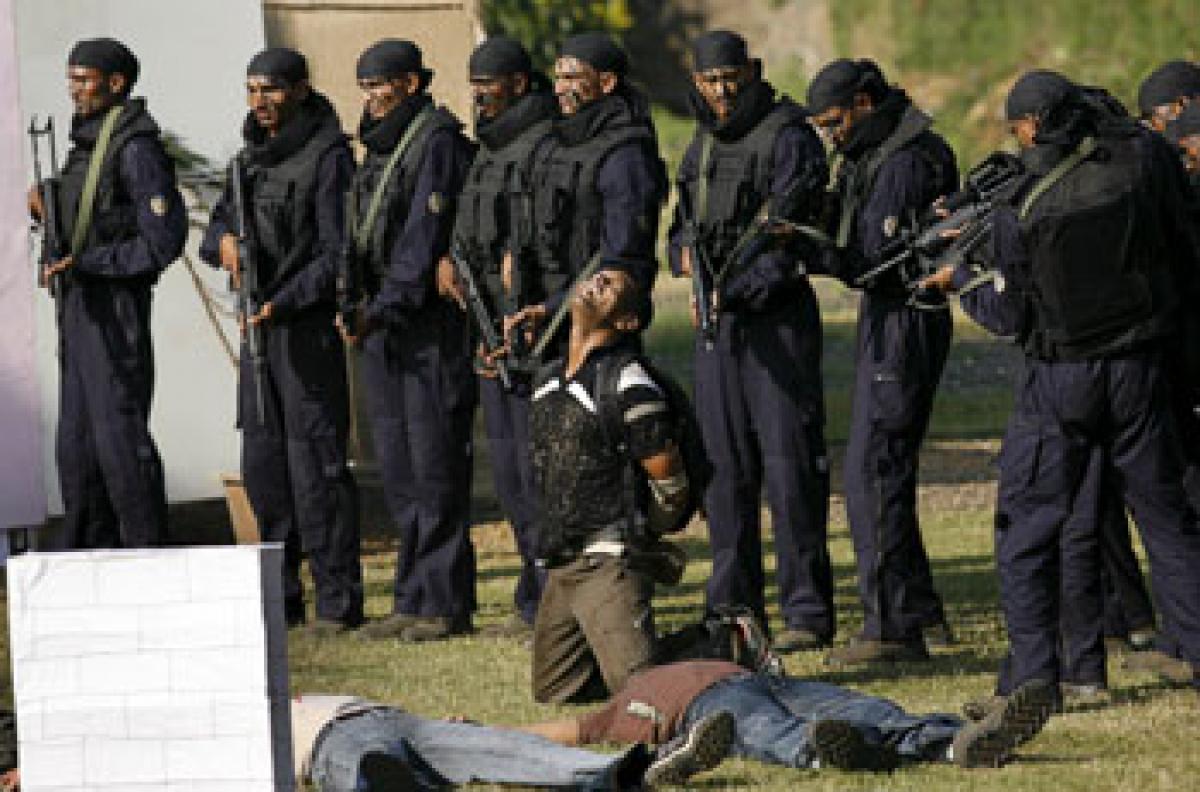Live
- ‘Get Set, Grow Summit 2024’ Focuses on Digital Detox for Families
- Stokes motivates his team to put in extra effort, says England pacer Potts
- From overcoming setbacks to leading India in U19 Women’s Asia Cup, Niki Prasad's amazing journey
- Driving Enterprise Security: Inside Venkata Reddy Thummala’s Leadership Journey
- Constitution debate: PM Modi hails 'Nari Shakti'; makes strong pitch for 'United Bharat’
- Abhijeet Bhardwaj: Revolutionizing Enterprise Analytics with Innovation and Expertise
- Bihar: Inquiry initiated against principal who went to buy veggies during school hours
- Press Sri Lankan Prez for release of Indian fishermen: TN Cong MP to EAM Jaishankar
- TN: DMK postpones executive meet due to heavy rains & Parliament session
- Porous silicon oxide electrodes can fix durability issues in batteries: Researchers
Just In

Last month, during an exercise to test India\'s readiness for a militant attack, teams of Coast Guard approached Mumbai and surrounding areas by sea, just as assailants did before deadly strikes in 2008. Several teams slipped through undetected.
 Mumbai/New Delhi : Last month, during an exercise to test India's readiness for a militant attack, teams of Coast Guard approached Mumbai and surrounding areas by sea, just as assailants did before deadly strikes in 2008. Several teams slipped through undetected.
Mumbai/New Delhi : Last month, during an exercise to test India's readiness for a militant attack, teams of Coast Guard approached Mumbai and surrounding areas by sea, just as assailants did before deadly strikes in 2008. Several teams slipped through undetected.
Officials say the response to the mock assault in Maharashtra was not a disaster, but the shortcomings it exposed were a reminder of India's vulnerability to the kind of violence that hit Mumbai seven years ago, when 166 people were killed, and Paris only last month.
"There was a mixed result," said a navy spokesman in Mumbai, describing the mid-November exercise that, by coincidence, came days after gunmen targeted Paris on November 13, killing 130. "We do find weaknesses, but over the years the number of people who can go through (our defences) is much less."
The atrocity in France drew immediate comparisons with events in Mumbai in 2008, when 10 gunmen landed on the city's shores by boat, split into pairs and attacked various high-profile sites using semi-automatic weapons.
In response, Mumbai police got better equipment, and a unit of the National Security Guard (NSG) was deployed to the financial capital. Fishermen have been made aware of the seaborne threat and can call a helpline if they spot anything suspicious. Maharashtra also set up its own elite counter-terrorism police unit: Force One.
But the initial zeal with which the threat was treated has faded, security experts said. "A lot of effort goes in at first. But over time, people lose interest. Momentum is lost. There is no leadership continuity," said Govind Sisodia, a senior commander of the NSG at the time of the Mumbai raid.
Sisodia, now retired, was unable to scramble his elite force from its headquarters in New Delhi for 12 hours after the start of the Mumbai attack because no plane could be found.
Poorly armed, trained and equipped police first-responders were no match for the heavily armed gunmen who simultaneously attacked multiple targets. The drama evolved into a hostage crisis that dragged on for three days.
Seven years after the attack, Force One has yet to move into its promised purpose-built headquarters outside the city. For now, it protects one of the world's largest metropolitan areas from a modest office on the fourth floor of a shabby low-rise building which it shares with a police academy. Lines of drying laundry hang from the windows.
Some of the commandos in Force One, modelled on Germany's GSG 9 special forces, are allowed to live at home. According to some officials, the 600-strong force trains on a police parade ground.
A critical worry, say security experts, is that tactics used by militants are evolving. While the attack on Paris echoed elements of that in Mumbai, it also differed, for example in the use of suicide belts to maximise casualties and rule out capture.
Historically, India has not been a hotbed of Islamist militancy, and its main security focus has been on containing a separatist insurgency in Kashmir, which it disputes with arch-rival and neighbour Pakistan.
Intelligence agencies have little handle on tens of thousands of Indians working in Iraq, the Gulf and beyond. According to the government, there are 18,000 Indians in Iraq, parts of which are under the control of Islamic State, although some experts say the real number may be much higher.
"Our data (on labourers) working abroad, especially in the Gulf, who are usually targeted for joining IS, is woefully inadequate," said Vappala Balachandran, a senior foreign intelligence specialist who led an inquiry into the Mumbai attacks. "This is a serious cause for worry."
A recent Indian intelligence report found Islamic State had recruited 23 Indians, but the radical group considered them to be "inferior fighters". The main threat to India, security analysts say, is from militants crossing from Pakistan, as was the case in the Mumbai attack and in a July raid on a police station in Punjab that killed at least nine. Urban settings are seen as their most likely targets.
By Clara Ferreira-Marques & Douglas Busvine

© 2024 Hyderabad Media House Limited/The Hans India. All rights reserved. Powered by hocalwire.com







